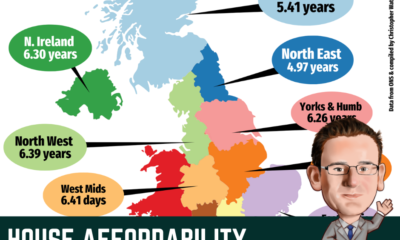Property Market News
Labour’s Housing and Property Market Manifesto: What Leicester Homeowners & Landlords Should Know
Now we know Labour will be taking the reins of government and ushering in a new era of policies and promises, particularly in housing and property markets. Their manifesto outlines ambitious plans to address the chronic issues of housing affordability, renters’ rights, and homelessness. However, the practical implementation of these initiatives, especially in a local context like Leicester, raises significant questions. Yet before we look at those, it is essential to see what has happened up to this election.
Impact of the General Election on the UK Property Market
Despite the anticipation and uncertainty surrounding the general election, the UK property market has shown resilience and strength. For June, UK house prices for homes sold (subject to contract) remained robust at £348 per square foot, marking a 5.1% increase compared to December 2023. This demonstrates the market’s ability to sustain growth even amidst political changes.
The volume of property listings has also seen a notable rise, with 35.6k UK listings recorded this week, reflecting a 7.5% increase compared to the year-to-date average from 2017 to 2020. This suggests that homeowners remain confident in the market and continue to list their properties despite the election.
Sales figures further illustrate the market’s positive trajectory. Total gross sales reached 26,198, 6.9% higher than the average from 2017 to 2019 and 6.4% above the 2024 weekly average. Additionally, net sales this week stood at 20,028, representing a 20.8% increase compared to the same week in 2023. While there has been a slight uptick in sale fall-throughs, at just under 1 in 4 sales (23.5%), this is still below the seven-year long-term average of 24.8%, indicating stability in the market.
In summary, the recent general election has not significantly impacted the UK property market. House prices have continued to rise, listings and sales have increased, and the market remains strong, providing a positive outlook for homeowners and landlords.
So, let us address the future.
Addressing the Housing Shortage
Labour has set a bold target to build at least 150,000 council and social homes each year. This move aims to tackle the severe shortage of affordable housing, ensuring that more people have access to secure and decent homes. Many of these new homes will be council houses, providing affordable options for families and individuals. However, the manifesto lacks clarity on where the funding (£18.9 billion per year to build those council and social homes, excluding the cost of the land) for this extensive construction project will come from, raising concerns about the feasibility of such an ambitious goal.
Their manifesto includes reinstating housebuilding targets for local authorities, hiring 300 more planning officers funded by increased stamp duty for overseas buyers, and selecting sites for new towns by year-end. Compulsory purchase rules will be revised to eliminate ‘hope value,’ some green belt areas may be reclassified as ‘grey belt’ for potential development. Local buyers will be given priority for new homes, and a permanent mortgage guarantee scheme is proposed.
Despite some practical ideas, Labour’s approach faces challenges. Greater use of compulsory purchase powers could help provide affordable housing, but balancing property rights and addressing NIMBY’ism within the environmental movement will be difficult. Previous governments have struggled with ambitious housebuilding plans, and Labour’s stance on issues like nutrient neutrality rules remains vague, raising doubts about their ability to implement these changes effectively.
Enhancing Renters’ Rights
With Labour’s plan to abolish Section 21 evictions, renters can expect more stability, which currently allows landlords to evict tenants without a reason. However, this change will only be implemented once the government has reformed the courts, aiming to provide more security for renters. This could take years to sort. Additionally, Labour intends to introduce rent controls to cap excessive rent hikes, which has proven contentious in other markets. Historical data from Scotland and worldwide indicate that rent controls often lead to decreased investment in rental properties and a reduction in the overall quality of available housing, potentially causing more harm than good.
Other key Labour measures include ending bidding wars for rental properties, capping upfront payments required to secure a rental, and mandating that all rental homes meet an EPC rating of C or above by 2030. These policies are designed to provide more stability and affordability for renters, with Labour estimating that these energy efficiency improvements could save tenants £250 annually. While these changes intend to benefit tenants, they also impose new responsibilities on landlords, requiring them to invest in property upgrades and adhere to stricter rental practices.
Another significant change for the rental sector is the creation of a national landlord register. This initiative aims to improve standards and accountability in the private rental market, ensuring landlords maintain their properties to a decent standard.
Supporting First-Time Buyers
Labour’s manifesto also promises to support first-time buyers by reducing the barriers to homeownership. This includes increasing the availability of affordable housing and offering financial incentives. Such measures could stimulate market activity and make it easier for young people and families to purchase their first home, although the specifics of these policies remain vague.
Promoting Housing Standards and Sustainability
To ensure all homes provide a safe and decent living environment, Labour plans to enforce a Decent Homes Standard. This standard will focus on improving safety, decency, and energy efficiency, setting clear criteria for what constitutes a ‘decent’ home. Additionally, millions of homes will be retrofitted to enhance energy efficiency, reduce carbon emissions, and lower energy bills. This initiative reflects a strong commitment to sustainability, which could also create new opportunities and challenges for the property market in Leicester.
Tackling Homelessness
Labour is committed to ending rough sleeping within five years by increasing support and housing options for people experiencing homelessness. This pledge highlights a significant focus on social welfare and community well-being.
Regulating the Housing Market
Labour also intends to reform land and property taxes to ensure fairness and efficiency in the housing market. Additionally, they aim to curb property speculation and reduce the number of vacant homes by imposing higher taxes on empty properties. These measures could stabilise the market and make housing accessible to needy people.
Implications for Leicester Landlords and Homeowners
These policies will bring changes, especially for Leicester landlords. Increased regulation, particularly in the rental sector, will require landlords to ensure they are extracting the maximum value of their investment. It shocks me that so many landlords haven’t increased their rents for years. With some of these changes on the horizon, Leicester landlords should seriously consider making those changes in the coming months. Call me on 07917 899495 if you need any advice.![]()
The push for affordable housing and support for first-time buyers might alter market dynamics in the rental and lower-priced starter home markets, potentially impacting property prices and rental rates (yet not in a big way). Furthermore, focusing on energy efficiency and sustainability will likely lead to new opportunities and challenges in property development and management.
In my considered opinion, the changes for Leicester homeowners will be quite minimal. Building more homes will temper house price growth, yet that isn’t always a bad thing. People tend to move when they need to move, not based on house prices. So overall, I can’t see a huge change for Leicester homeowners over the next five years.
Overall, for all property owners, it is essential to remain realistic.
Historically, not all manifesto promises come to fruition. The Conservative government managed to start (let alone finish) only 55% of their 2019 manifesto commitments. Given this precedent, it’s reasonable to doubt that Labour will deliver all their promises, let alone swiftly.In conclusion, while Labour’s manifesto presents a comprehensive plan to address housing issues, it will likely take time before significant changes are felt in Leicester. Landlords should prepare for a slightly more regulated environment. Yet, we have seen increased regulation over the last decade, so the immediate impacts may be limited as the government navigates the complexities of implementing these ambitious policies.












